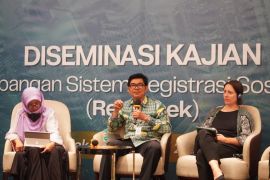Finance Minister Bambang Brodjonegoro said wide current account deficit had been the main cause of currency instability.Jakarta (ANTARA News) - The government will take a number of steps to control rupiah fluctuation such as by reducing the countrys current account deficit.
Industrialists began to worry about rupiah weakening lately that resulted in increase in production cost.
Finance Minister Bambang Brodjonegoro said wide current account deficit had been the main cause of currency instability, "therefore, we have to take care of the problem in our current account balance."
For that purpose the government will improve the countrys foreign trade balance and financial service account which have been dominant in contribution to the deficit in the countrys current account balance, Bambang said here on Tuesday.
In 2014, the country had a current account deficit of US$6.1 billion or 3 percent of its Gross Domestic Product (GDP).
Bambang said the performance in foreign trade would be improved such as by issuing a finance minister regulation on flexibility of provisional anti dumping import duty and safeguard import duty.
He said the regulation is to control imports while awaiting the result of investigation of alleged dumping.
"If the investigation found that dumping had been committed the anti dumping import duty would be maintained and become permanent, but if it turns out that no dumping is committed we will repay the anti dumping import duty," he said.
In addition, the government will offer tax allowance to boost foreign and domestic direct investment, he added.
He cited tax allowance will be offered for companies exporting at least 30 percent of their production.
The government is also ready to issue a regulation exempting shipyards from value added tax (VAT) and review the policy of the use and expansion of the use of 10 percent bio-diesel to accelerate the process of energy conversion.
In a bid to reduce deficit in financial service account, the government will offer tax allowance for companies reinvesting profit in the country by not transferring all dividend abroad.
"Companies will be entitled to tax allowance choosing to reinvest rather than transferring dividends abroad," he said, adding,"this could help Bank Indonesia cope with current account deficit which is normally larger in the second quarter of a year."
In the second quarter of 2014, the countrys current account deficit surged to US$9.1 billion, up from US$4.2 billion in the first quarter of that year.
Bambang said other policies include taxation scheme of VAT on shipping industry to make it more competitive , encouraging expansion of state-owned reassurance industry, improving remittance system to facilitate inflows of Indonesian income into the countrys financial system, etc.
Earlier in the day, an economist from the University of Widaya Mandira (Unwira) Kupang Dr Thomas Ola Langoday warned the government not to take lightly the shrinking value of the national currency rupiah against the US dollar.
Continued fall of the rupiah value would weigh on the countrys economy , Dr Thomas said .
He described as fundamental the impact of the rupiah weakening on the economic growth.
Rupiah exchange rate on Tuesday stood at the level of 13,050 per dollar on Tuesday morning from 12,975 early this month.
On Monday, President Joko Widodo told the people not to get panic over the shrinking value of rupiah saying the setback, caused by external factors, was temporary.
Dr Thomas said everybody agreed that external factors had been the main causes of the rupiah weakening, "but dont blame foreign factor for our weaknesses in economy of being lacking orientation to export."
The task of stabilizing rupiah should not be entirely relied on Bank Indonesia, he said.
Bank Indonesia could could use its foreign exchange reserves to buy and prop up rupiah but such step is effective as a short term solution, he said.
The governments policy should be based on long term perspective to improve the countrys position in global competition.(*)
Editor: Heru Purwanto
Copyright © ANTARA 2015











